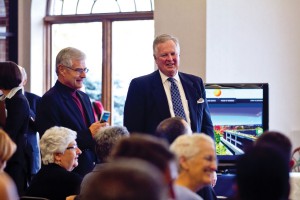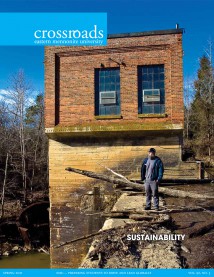
President Loren Swartzendruber ’76, MDiv ’79, DMin, at the dedication of EMU's first solar array.
This issue of Crossroads comes to you soon after a historic action of the Harrisonburg City Council to grant a 20-year 100 percent tax exemption for commercial solar projects. Our first solar array, on the roof of Sadie Hartzler Library, online since November, is producing 2 percent of our campus electric consumption. The action of the City Council boosts the possibility of adding a much larger array over the University Commons’ north parking lot.
The April 2011 issue of Virginia Business magazine features an article on “green” initiatives around the Commonwealth, with the solar projects at EMU highlighted. The University of Virginia and other higher education institutions have contacted us to learn about our projects!
The late Dr. Robert C. Lehman, a physical science professor at EMU in the 1960s and 1970s, was the first to systematically address ways that EMU was frittering away natural resources – he spent his 1976-77 sabbatical studying campus energy consumption. Since then many faculty and staff members have worked at better managing our utility costs, thereby saving the institution thousands of dollars and, more importantly, reducing our consumption of non-renewable resources. Eldon Kurtz, director of EMU’s physical plant since 1997, has long championed environmentally sustainable practices. Our strategic plan calls for future buildings, new and renovated, to be constructed to LEED [Leadership in Energy & Environmental Design] certification standards.
Students have strongly encouraged the institution to be creative in our stewardship of the earth’s environment. EMU has responded to this interest with a new major in environmental sustainability, where students can choose between concentrating on the social, economic and political aspects of sustainability, or concentrating on its biological and chemical aspects.
This issue of Crossroads highlights more than 100 EMU alumni who are making major contributions to the sustainability movement around the world. We believe that caring for God’s creation is a theological and faith imperative, as well as a matter of good science, and that sustainability practices should not be dependent on one’s political persuasion. We do not believe it is God’s intention that humans should take a cavalier attitude toward the environment, a point on which we may differ from some segments of the faith community. We believe that sustainability practices should begin with how we care for ourselves physically, organize our family and community life, and promote a healthy approach to living that encompasses every aspect of human existence.
Loren Swartzendruber
President
